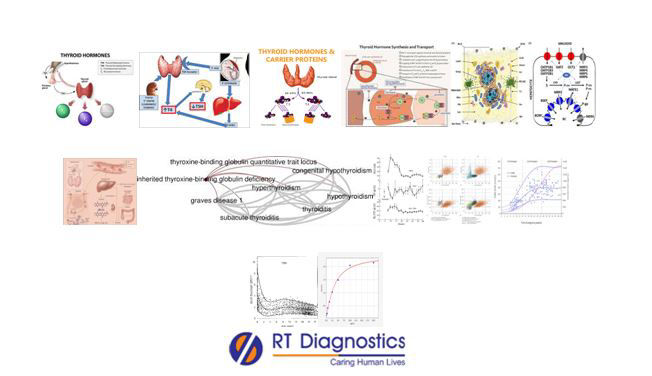Thyroxine Binding Globulin -TBG:
Why Thyroxine Binding Globulin - TBG Test?
CLINICAL INFORMATION
Thyroxine (thyroid hormone) is the major active (T4- tetra iodothyronine) form of thyroid hormone secreted in the thyroid gland. The physiological functions include growth regulation, brain development, metabolism (cellular metabolism) – BMR etc.
Thyroxine-binding globulin (TBG) is a major transport protein primarily responsible for transporting thyroid hormone to necessary tissue. The other thyroxine-binding proteins include albumin and transthyretin. Among the three thyroxine carriers (transport proteins) in the body, TBG has the highest affinity. Thyroxine-binding globulin is (a serine protease inhibitor) synthesized by the liver. The gene encoding for TBG protein is located at the long arm of the X-chromosome. Thus X-linked inherited patterns or mutations (frame-shift mutation, missense mutations) are identified in etiology of inherited TBG deficiencies. The function of TBG is to maintain the normal levels of thyroid in the body. Patients with hyperthyroidism have an increased rate of turnover of TBG. Inherited TBG (genetic predisposition) deficiency is reflected as congenital hypothyroidism (usually TBG levels are normally high in newborns). Other factors that influence TBG are interleukin-6, levels of sex hormones in the body (androgens or testosterone decreases the TBG levels, whereas estrogen increases the TBG levels), terminally ill patients etc. Deficiency of TBG is also associated with severe liver disease, protein-wasting nephropathy, use of anabolic steroids, Turner’s syndrome etc. TBG test is performed to find the cause in cases with altered thyroid levels in the body. Clinical manifestations (symptoms) of thyroid disorders (hypothyroidism and/or hypothyroidism) include constipation, diarrhoea, insomnia, dry skin, puffy skin, fatigue, weakness, hair loss, hand tremors, sensitivity to cold, sensitivity to light, and weight changes, and menstrual irregularities etc.
An increase in TBG levels in the blood can occur due to the intake of medications such as OCPs, heroin, methadone, and phenothiazines (anti-psychotic drugs), whereas the decrease in TBG may be due to certain medications like valproic acid, phenytoin, high doses of aspirin (salicylates), prednisone, male steroid (androgen i.e testosterone) etc. TBG levels can be reduced by certain pathologies like hyperthyroidism, kidney disease, liver disease, severe systemic illness, Cushing’s syndrome etc.
Abnormal results for TBG may result due to various pathologies. An increase in TBG can arise in conditions including acute intermittent porphyrias (metabolic disorder), pregnancy (TBG levels are normally increased), hypothyroidism, and liver diseases. While a decrease in levels of TBG can be found in cases associated with acute illness, acromegaly, hyperthyroidism, malnutrition, nephrotic syndrome and stress (surgery). Additional tests include the transthyretin test, LFT, pituitary hormones test (TRH), TSH, thyroid hormones T3 and T4 etc. Other tests include CBC, sex hormones, protein (albumin) test, urine (albuminuria) test, KFT, karyotyping for X-linked genetic disorder etc.

General Instructions:
Sample Requirement: Specimen - Blood sample collected from the vein. Test Preparation: None.
NOTE - Sample for specimen collections may vary based on the patient’s condition/cases according to the patient’s presenting complaints/signs or symptoms:
SPECIMEN REQUIREMENT (Special or Rare Cases) - As instructed and guided by Physician / Clinician / Pathologist / as per Laboratory’s requirements, according to procedures and protocols.
This Multi-Specialty Clinical Referral Laboratory RT DIAGNOSTICS provides precise and accurate tests with an extensive range of testing services to the medical centres to help in the diagnosis and identification of pathology in the test specimens for infectious diseases and also to evaluate the function of organ systems of the patient. It prevents further complications and helps to stabilize and restore health to near normalcy at the earliest without delay.



